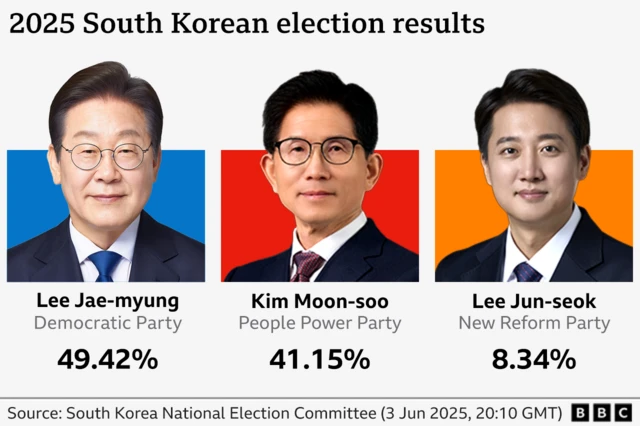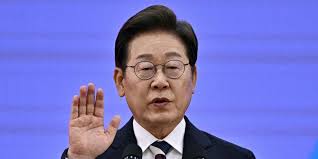Introduction
Just hours after winning a snap presidential election in 2025, South Korea’s new president, Lee Jae-myung, vowed to “unite the people” in a powerful inauguration speech. His victory, securing 49.4% of the vote, comes amid deep political divisions following the impeachment of former president Yoon Suk Yeol and months of political chaos triggered by Yoon’s controversial attempt to impose martial law.
Lee Jae-myung’s Vision for National Unity

In his address to the nation, Lee promised to restore democratic principles and end the politics of division that have plagued South Korea in recent years. Speaking before a crowd in front of parliament — where he notably protested Yoon’s martial law declaration six months prior — Lee condemned political factions focused on power rather than the people’s welfare. He pledged to build a “flexible, pragmatic government” and announced an immediate activation of an emergency economic task force to address urgent national issues.
The Political Backdrop: Impeachment and Division
Lee’s rise to power is remarkable given the turbulent political backdrop. Former president Yoon Suk Yeol’s attempt to impose martial law ignited months of instability and ultimately led to his impeachment. Political analysts view Lee’s victory less as an endorsement of his agenda and more as a public rebuke of Yoon’s administration and a demand to protect democratic institutions.
National Assembly Speaker Woo Won-shik remarked that the election outcome was a “fair reflection of the will of the people,” expressing frustration over the democratic breakdown during Yoon’s presidency. This sentiment was echoed by many voters who used the election to voice their outrage and desire for accountability.
Challenges Ahead for President Lee
Despite widespread support, Lee faces significant challenges. He is currently under trial in the Supreme Court for alleged election law violations, a trial postponed until after the election to avoid interference. While sitting presidents generally enjoy immunity from prosecution, the legal situation remains complex.
More importantly, Lee must navigate a deeply polarized political landscape. Years of escalating factionalism have left South Korea divided, with supporters of the impeached Yoon still vocal and influential. Many back Yoon’s actions, including the martial law attempt, and some promote conspiracy theories of election fraud.

Lee’s promise to foster unity will be tested by the need to hold Yoon’s supporters accountable without exacerbating divisions. Analysts warn that transforming public anger into constructive governance will require delicate balancing and a commitment to democratic values.
Public Reaction and Hopes for the Future
Supporters of Lee Jae-myung are optimistic about his presidency. Many gathered during the inauguration, expressing hope that Lee will create a fairer society where laws are enforced impartially. Software engineer Leo Kil shared his excitement: “I believe he will carry out his basic promises, like creating a fair world. I have really high expectations.”
Meanwhile, the opposition’s strong base, particularly young male voters, remains a potent force in South Korean politics. Figures like Lee Jun Seok, known for his anti-feminist views, continue to influence political discourse and shape voter behavior.
Conclusion
President Lee Jae-myung steps into office at a pivotal moment for South Korea. With a mandate to unite a fractured nation, he must address the wounds left by political upheaval while charting a pragmatic path forward. How effectively he transforms widespread public fury into hope and healing will shape South Korea’s political future.
Learn more about the evolving South Korean political landscape and what this means for regional stability.









